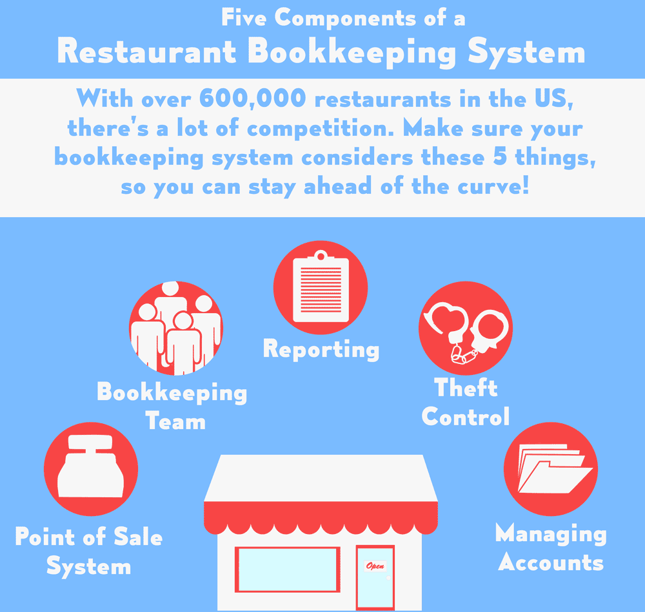5 Things to Consider with Restaurant Bookkeeping
Every restaurant's bookkeeping is unique. The business has to bring in information from many different sources, track daily sales, complete credit card transactions, and monitor inventory.
There are so many different methods for recording each that it takes a customized system to make sure the information is being recorded correctly.
In order to maintain function and control within a restaurant, five components are necessary: (1) a POS system, (2) a bookkeeping team, (3) financial reporting, (4) anti-theft mechanisms, and (5) a solid method for handling accounts payable.
|
What do you need to consider with restaurant bookkeeping? |
1. Restaurant POS System
We've seen clients deal with up to three different restaurant POS systems before finding one that works for their business and reports the way that makes the most sense to them. This is expensive, time consuming, and frustrating. For instance, before Square went public, it didn't have a very good reputation for having great back-end reporting. However, now that they're public and have some money to fix their major issues, the new reports are not bad. But one of the systems we tend to refer clients to the most is Aloha by NCR. It's easy to use and, even better, easy to train employees on. Their customer service is great too. The daily sales summary and importing of sales data into QuickBooks or other accounting systems is fairly easy. Most important, Aloha can give restaurant owners the ability to get information that is meaningful to them.
Finally, to cover your bases and prevent a costly mistake, check with industry experts to make sure the POS system you've selected is compatible with your accounting software.
2. Having a Bookkeeping Team
The first question: can you afford a bookkeeper? Hiring someone full-time requires more than just a paycheck and gets expensive very quickly. Second, will they even have enough work to keep them busy for 40 hours a week? Also, hiring someone part-time increases the chance that they will go somewhere else, leaving you back in the same place and looking for someone else. Utilizing an outsourced bookkeeping service can help, as turnover won't happen, they have more experience and information than just one bookkeeper, and can do the work in less time. The outsourced accountant can actually give some consulting that will help you make better financial decisions and show you how to use your financial information more effectively. Financial records are not just a method to show the IRS you paid your taxes. Experienced bookkeepers can show that your records are more valuable than that.
Click here to find value in your books and financial statements

3. Reporting for a Restaurant
Financial ratios are important to achieve and maintain healthy margins in a small business. Accurate reporting starts with a bookkeeping system with proper implementation and updates on a regular basis.
- Labor ratios - a fair goal for labor is 30-35% of total sales.
- Prime cost - The cost of food, beverage, and labor should be about 60-65% of total sales.
- Food cost - industry dependent; anything below 30%, you're on the right track.
Having a tight bookkeeping system in place helps ensure that margins are controlled. In an industry where margins are traditionally tight, cash will burn quickly if margins shrink.
4. Theft
What better way to ruin your day? Although there's insurance to get cash back from theft, it's such a blow. Having a proper bookkeeping system in place ensures that thieves are caught early. However, employees aren't the only thieves to worry about. There's the co-owner, managers, and yes, even your bookkeeper.
- Co-owners are drawing when they shouldn't.
- Managers are pocketing cash that should be deposited.
- Bookkeepers have the ability to write checks and also input all cash transactions (but they shouldn't).
- Customers are leaving with inventory.
Having a system in place keeps all these people in check. A co-owner draw will show in the books. Managers attempting to pocket cash will be caught when comparing the daily sales summary and the recorded bank deposit. Having internal audits or minimizing a bookkeeper's control keeps them in check. Inventory discrepancies can indicate customer or employee theft.
Theft is a crime of opportunity, and the system doesn't take away the opportunity completely, but it lets people who steal know that if they want to take, they're going to be caught.
5. AP: Managing Your Vendors
It may seem easy, but managing accounts payable in a restaurant can be difficult. Bills need to be entered into the accounting system and paid on time. It takes a lot of time, and especially for multi-location restaurants, it can be a challenge. However, this process can largely be automated with software. Here's how:
- The company administrators scan the bills with an OCR scanner into a cloud document collection system like Hubdoc.
- Connect Hubdoc, QBO, and the bill pay system Bill.com to your Hubdoc account.
- Pay bills using Bill.com with your phone or web browser.
Making sure that vendors get paid saves money. You can get discounts for paying early. And it ensures they're not going to raise your rate due to a delinquent account. Keeping vendors paid also ensures they'll continue to bring product. Credit among businesses is just as important as credit among consumers.
Margins are too tight in a restaurant to let the books slip to the side. Implement a proper system to make sure the margins remain healthy.
You may also want to check out restaurant bookkeeping 101.
Source: https://www.npd.com/wps/portal/npd/us/news/press-releases/us-total-restaurant-count-increases-by-4442-units-over-last-year-reports-npd/


Comments